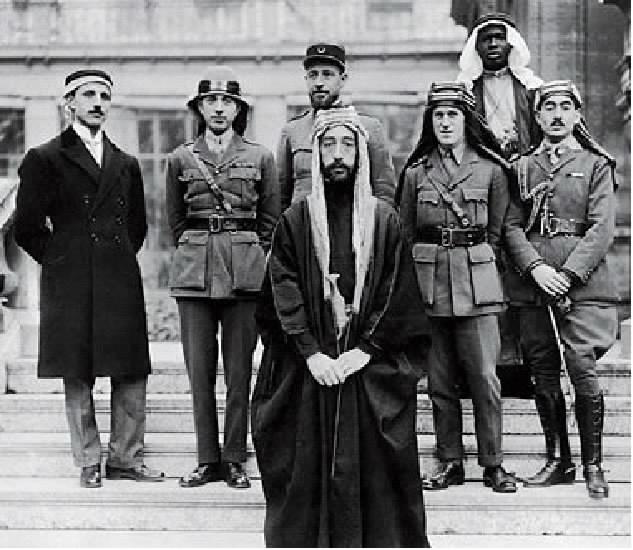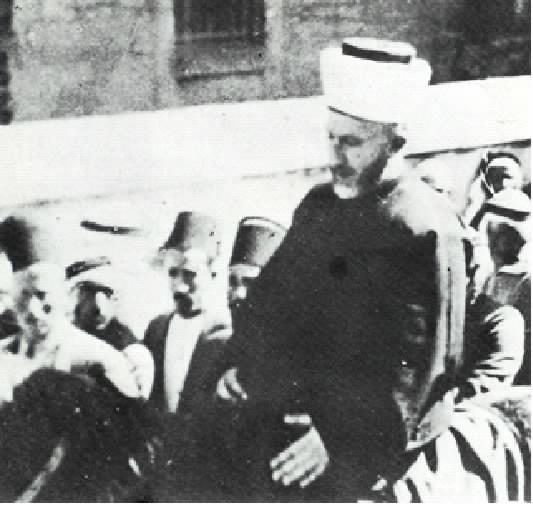...We are defending freedom today, and our future as a sovereign nation, against an aggressive assault by the evil forces of radical Islam as personified by Osama bin-Laden.
...I trace the origin of today's war against the west to the post World War I period, 1918-1921. This was a time when new sovereign nations were emerging in Europe and the winds of freedom and hope were sweeping across a Middle East that had been suppressed for centuries by the recently defunct Ottoman Turkish Empire.
..Emir Faisal ibn Hussein, the Hashemite son of Hussein, Sherif of Mecca, and considered by many to be a direct descendent of the Islamic Prophet Mohammad, typified the pro Israel viewpoint amongst Arabs at that time. Faisal, who would become King of Syria and later King of Iraq, was the head of the accredited delegation of Arab representatives attending the Paris Peace Talks where the League of Nations was established.
Faisal met with Chaim Weizmann, the accredited head of the Zionist delegation to the Paris peace talks, in London where he signed a document known as the Faisal-Weizmann Agreement, January 3, 1919.
The Faisal-Weizmann Agreement includes the following provisions:
Article I
The Arab State and Palestine in all their relations and undertakings shall be controlled by the most cordial goodwill and understanding and to this end Arab and Jewish duly accredited agents shall be established and maintained in their respective territories.
...Article IV
All necessary measures shall be taken to encourage and stimulate immigration of Jews into Palestine on a large scale, and as quickly as possible to settle Jewish immigrants upon the land through closer settlement and intensive cultivation of the soil.
...(Signed) FAISAL IBN HUSAIN (in Arabic)
(Signed) CHAIM WEIZMANN
The Faisal-Weizmann Agreement, a founding document of the League of Nations, is a recognition by the Arab and Muslim nations of the State of Israel and is legally binding international law. All of its provisions have been fulfilled. The Arab and Muslim nations are sovereign. The rights of the Israeli Arab are assured. The Islamic holy sites in Israel are under Moslem control.
The final borders of the Jewish State were determined by a commission headed by Winston Churchill back in 1922, which divided the British Palestine Mandate into an Arab sector east of the Jordan River and a Jewish sector west of the Jordan River. This is exactly where Jewish Palestine, Israel, and Arab Palestine, Jordan, are situated today. The borders of Israel correspond exactly to the borders described in the Torah as the Holy Land. The Torah describes the Holy Land as from Dan to Beersheba, from the Jordan River to the Mediterranean sea.
Regarding the Faisal-Weizmann Agreement, Emir Faisal wrote the following to Harvard Law School Dean and later US Supreme Court Justice Felix Frankfurter:
We feel that the Arabs and Jews are cousins in race...and by a happy coincidence have been able to take the first step towards the attainment of their national ideals together.
We Arabs, especially the educated among us, look with the deepest sympathy on the Zionist movement. ...We will do our best, in so far as we are concerned, to help them through: we will wish the Jews a most hearty welcome home.
We are working together for a reformed and revived Near East, and our two movements complete one another. The Jewish movement is national and not imperialist. Our movement is national and not imperialist, and there is room in Syria for us both. Indeed, I think that neither can be a real success without the other.
...May the Arab and Muslim nations honor this noble agreement entered into with Israel in 1919 by the recognized leaders of the two peoples, a just and fair agreement that is entirely in accord with the national and religious interests of both Muslims and of Jews.
The Mufti
There was another wind blowing in the post World War I years and that was the sinister wind of totalitarianism. ...Faisal's enlightened vision of sovereign Arab nations co-existing with a sovereign Jewish State was eclipsed by the radical pan-Arab designs of Haj Amin al-Husseini, named as Mufti of Jerusalem by the British Governor of the Palestine Mandate, Sir Herbert Samuel, in 1921. This was after al-Husseini had been convicted in absentia for his involvement in a slaughter of Jews in Jerusalem in 1920, known in Israel today as Bloody Passover. The liberal Samuel, himself a British Jew, pardoned al-Husseini, returned him from exile, and chose him as Mufti and head of the political Supreme Muslim Council in Palestine in spite of the fact that he had been opposed by the Palestinian Arab population who placed him in fourth place in a field of four Arab candidates for the position of Mufti.
In the nineteen twenties and the early nineteen thirties, the Mufti agitated against the Jews, incited a bloody riot in 1929 involving a mass slaughter of the indigenous Jewish community of Hebron, and instituted assassinations and suicide bombers who would target Arabs who refused to take his side in his fight against the Jews. Many Muslim and Christian Palestinian intellectual leaders and clerics were assassinated by the Muftis men for opposing his terrorist agenda.
...The Mufti became a leader of the Arab and Islamic world as he attended conferences and sent envoys to Muslim nations as far away as Malaysia to raise money to, among other projects, gold plate the Dome of the Rock Mosque on the Temple Mount in Jerusalem claming that the Jews were plotting to blow it up.
...Swiss Nazi banker Fransois Genoud began to funnel money to the Mufti who used the funds to further the formation of pro-Nazi political organizations such as the Egyptian Green Shirts, headed by Abdul Gamal Nasser, who would become the Egyptian Dictator who instigated war against Israel in 1967, and to foment trouble against the British. The Mufti continued a close collaboration with Eichmann until the end of the war and with Genoud for decades after the war.
After instigating the Arab Revolt against British in Palestine in 1936, the Mufti fled Palestine. In 1941, the Mufti turned up in Baghdad where he played a major role in instigating a pro-Nazi coup against the pro-British government in Iraq. One of the generals involved in the pro-Nazi coup, General Kharilla Tulfah, was Saddam Hussein's uncle, father in law, and mentor. When the pro-Nazi coup failed, the Mufti recorded an anti-Semitic broadcast blaming the indigenous Iraqi Jews for the failure, which triggered the Fahud, a bloody pogrom against the Iraqi Jews, a community that pre-dated the Muslim invasion of Iraq by almost a thousand years.
The Mufti and Hitler
Fleeing Bagdad, and passing through Tehran, Istanbul, and Rome, the Mufti made his way to Berlin where he was met with all the pomp and circumstance of a visiting head of state. The Nazis gave the Mufti a mansion to live in, on fashionable Klostock Street in Berlin, one that had been confiscated from a Jew who was sent to a concentration camp, and the Nazis gave the already wealthy Mufti a hefty salary, which he received up until the last weeks of the war. The Mufti was given access to the SS controlled Sonderfund. These were monies and properties that had been confiscated from Jews as they were sent off to the ovens.
The Mufti used the sonderfund to support a Palestinian Arab expatriate community living in wartime Nazi Berlin, to train pro Nazi European Muslim militias in Bosnia and Russia, and to foment anti Jewish and pro Nazi activities in the Middle East where he maintained an extensive network of contacts. The Sonderfund financed the Mufti's Nazi-Muslim government in exile and was used to fund an Islamic Institute in Dresden under the Mufti. The purpose of the institute was to inspire an elite cadre of Nazi- Muslim leaders. More research is required to trace the career paths of these Nazi Muslim leaders after the war.
Monies derived from the sonderfund continued to flow into the Middle East, from Swiss bank accounts and with the involvement of Swiss-Nazi banker François Genoud and the Mufti, years and even decades after the end of World War II with the funds going to terrorists. Genoud committed suicide in 1996 at the age of 81 before a committee, investigating Nazi money laundering in Swiss banks and headed by former Federal Reserve Chairman Paul Volker, had the opportunity to interview him. More research is required to follow the Nazi money trail after the war.
The Mufti recorded several radio broadcasts, transmitted from a large tower in Bari, Italy into the Arab world, calling for Arabs to ""Kill the Jews wherever you find them. This pleases God, History and Religion. This saves your honor. God is with you."
It should be noted that the main line of propaganda used by Hitler and the Mufti against the Jews was that there was a Jewish conspiracy to rule the world. This was the basic thesis used against the Jews by Hitler in Mein Kampf and previously, in the Protocols of the Elders of Zion, a Russian forgery that was widely disseminated in those years...
The Mufti meets with Hitler
In November of 1941, the Mufti met face to face with Hitler, who promised that as soon as he finished off Europe, Nazi brigades would cross the Caucasus and conquer the Arab world. The Mufti would then be installed as the Nazi backed puppet head of a united Nazi-Arab Caliphate. Before the Hitler-Mufti meeting, the Nazis were still open to the idea of deporting Jews, possibly to Palestine. In 1939, the Allies closed the door to Jewish refugees at the Evian Conference thus condemning the Jews of Europe to the Nazi prison. It is reasonable to assume that the Mufti urged Hitler to not let Jews go to Palestine, which, at any rate, had been closed to Jews by the British, and instead urged, on the Holocaust. A few months after the Mufti-Hitler meeting, the Nazis held a conference at an estate in Wansee, a suburb of Berlin, where it was decided to systematically annihilate the entire Jewish population of Nazi occupied Europe.
The Mufti was directly involved in the Holocaust in various ways. Under the guidance of Himmler, of whom he maintained close contact, the Mufti was put in charge of recruiting and training a Bosnian Nazi-Muslim SS military unit known as the Hanzar Division, which grew to 27,999 men. Along with other Nazi-Muslim military formations in the Balkans and in Russia, the Hanzars would carry out the genocide of 250,000 Serbs, Gypsies and Jews. Himmler called for special treatment for Muslim troops and in a letter to Nazi Propaganda minister Josef Goebbels wrote: "I have nothing against Islam because it educates the men in this division for me and promises them heaven if they fight and are killed in action. A very practical and attractive religion for soldiers." Nazi-Muslim brigades in Russia were involved in the infamous einzatsgruppen, which were mobile killing units operating behind Nazi lines and charged with liquidating Jews and others viewed as enemies of the Nazi state...
After the War
At the end of the war, the Mufti fled, one step ahead of indictment by the Nuremberg Tribunal on charges brought by Yugoslavia, to Cairo and spent the rest of his life fomenting violence against Israel whenever possible. The British once again give the Mufti amnesty and he returned to Palestine to fight Israel in 1948 where he issued a fatwa: "I declare a Holy War, My Muslim Brothers! Murder the Jews! Murder them all!". After Israel became a state, the Mufti was implicated in the assassination of the moderate Hashemite King Abdallah of Jordan, the brother of the aforementioned King Faisal, who was about to make peace with Israel.
The Mufti aided in Operation Odessa, which was a ratline smuggling thousands of Nazi war criminals into Egypt and Syria. Many Nazis, once settled in Arab capitals, changed their names, converted to Islam, and involved themselves in war against Israel. The Mufti promoted the so-called "right of return" for Palestinian Arabs, this after having exhorted Arabs to leave Palestine during Israel's war of independence. The Mufti worked to keep Arabs in refugee camps to be used as recruiting centers to fight against Israel. In his last public appearance in a speech before a World Islamic Conference in 1962, the Mufti called for the ethnic cleansing of all Jews from the Arab world. He died in Beirut July 5, 1974.
The islamo-Fascist Mufti was mentor to the islamo-Communist Yasir Arafat, said to be his nephew. Arafat started his career at the age of 17 as a gunrunner for the Mufti's irregular militia, which participated in the 1948 war against Israel. After attending a communist youth convention in Prague in 1956, Arafat and a group of his cohorts went to Moscow for training where they formed the terrorist cell known as al-Fatah. After the collapse of Nazism, the Marxist founder of the Muslim Brotherhood, Egyptian professor Hassan el-Banna, openly allied his group with the Soviet Union. The secretive Muslim Brotherhood would later spawn both Hamas and Islamic Jihad. The connection between Arab terrorism and the Soviets accelerated in the 1970's and 1980's.
Where do we go from here?
...eventually America will have helped the Muslim nations and peoples in their struggle against the followers of haj Amin al-Husseini, the Grand Mufti of Jerusalem.
The progressive vision of Emir Faisal will come to pass in the Arab and Muslim world but only with the support of the freedom loving western democracies.
... We need to stand with those Muslims who love freedom and utterly crush those who seek to oppress their own people, to kill us, and destroy our way of life.
...The Palestinian question was settled in 1921 when Palestine was divided into a Jewish and a non-Jewish Arab sector. Jordan is east Palestine, Israel is west Palestine.
The Jews of Israel are as much Palestinian as the Arabs of both Israel and Jordan.
Local autonomy should be granted to the Palestinian Arabs of Judea, Samaria, and Gaza with Jordan playing a role to be determined and Israel maintaining overall military and security control. Jews should never again be ethnically cleansed from any part of Israel...





